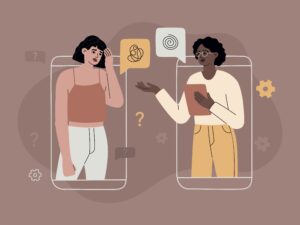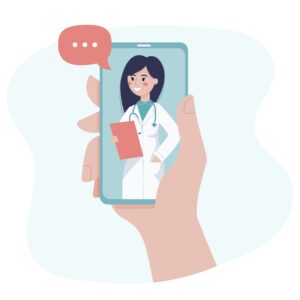 The way you can have a consultation with your GP has changed permanently over the last two years, accelerated by the demands and changing needs of the Pandemic. To contact a doctor in your community you now to need to first complete an online eConsult to contact a health care professional directly, removing the need to call and make an appointment.
The way you can have a consultation with your GP has changed permanently over the last two years, accelerated by the demands and changing needs of the Pandemic. To contact a doctor in your community you now to need to first complete an online eConsult to contact a health care professional directly, removing the need to call and make an appointment.
When a new form has been submitted it is attached to the correct patient record on our IT system. eConsult will automatically highlight any worrying answers such as ‘passing blood’ or ‘unexpected weight loss’, making it very easy for the GP reviewing eConsults to quickly spot any concerning symptoms. This helps us decide who is best placed to help you with your query, whether it is a nurse, doctor, pharmacist, or someone else. It also helps us work out whether the patient is best served by a telephone or an in-person consultation at the surgery. This has remained the same throughout the pandemic when we never stopped offering face to face appointments.
In our clinical experience, the majority of community medical queries can be handled over the phone and we are very experienced at doing this safely. Sometimes a patient will need to be physically examined to confirm a diagnosis, in which case we will call you to book a face to face appointment. Whilst most people are happiest with a phone call – no need to look presentable or trying to get to the surgery at an awkward time, with a full car park and crying kids – sometimes it’s just nicer to see who you’re speaking to.
The best of both worlds
 This is why we are delighted to be able to offer the latest in GP ‘telemedicine’: a video consultation. As clinicians, we have found this service helpful in providing visual cues and reassurance, building trust, and improving communication. If this is something you would like to take advantage of, please just make a note on your eConsult.
This is why we are delighted to be able to offer the latest in GP ‘telemedicine’: a video consultation. As clinicians, we have found this service helpful in providing visual cues and reassurance, building trust, and improving communication. If this is something you would like to take advantage of, please just make a note on your eConsult.
A video consultation is quick and simple to do. We will send you a text message with a link that takes you through to a secure chat room encrypted to NHS standards, where you will meet your clinician. All you need is a smartphone, tablet, or video-enabled computer. Our provider AccuRx has a quick tutorial to find out more.
Why can’t we see everyone face to face?
This is a great question. It has been the subject of very many news headlines recently and a hotly debated subject in the media. Even the Prime Minister weighed in on 22nd September that GPs need to deliver ‘more appointments’ as it was ‘only reasonable that people should be treated in person’.
The reason we don’t offer everyone an appointment in person in the surgery is quite simple: the way you contact a GP has changed. Since the pandemic every GP surgery was required to open up their access to an online system for infection control purposes (mostly the germy waiting rooms). Patients can now effectively leave an electronic answer-phone message 24/7 and be guaranteed a response.
This is an amazing service for patients. Instead of running the gauntlet each day to book a limited number of patient slots, GPs across the country have gone above and beyond to ensure that every single patient has speedy access to a healthcare professional. Our LWP figures show that we have had a 31% increase in our appointments pre-pandemic.
This means that we now provide a lot more appointments with the same number of GPs in the same amount of time. We have worked hard to increase our efficiency in order to maintain our number of patient contacts and ensure that every single patient has their medical needs met. This includes measures such as using text messages in order to deal with enquries such as ‘is my test result normal?’, as well as increasing the size of our clinical team by employing extra nurses, mental health workers and pharmacists.
Coming out the other side of the pandemic has shown that inevitably there are many people with complex concerns, such as mental health issues, chronic fatigue, migraines, and palliative care. When this is the case, we will not be hanging up the phone call at seven minutes to move on. The fact that you needed to reach out to us matters, and we will give you the care that you need.
This, incidentally, means our clinical team routinely work intense 12-13 hour days with barely time for a lunch break. Recruitment of more doctors is difficult because there has been national shrinkage of the GP workforce, mostly due to doctors leaving the profession due to burnout. The number of GPs in this country has fallen by about 2,000 since 2016.
Returning to the pre-pandemic days of all consultations being in person will severely limit access to GPs once again and patients will struggle to book an appointment. When GPs repeatedly call for greater investment in our sector we are putting our patients’ wellbeing, expectations and satisfaction first – because it is our community that directly benefit.
Until that happens, we continue at LWP to do what we do best: putting our patients health and wellbeing at the heart of our practice. Video consultations are a good option for those that like to see who they are speaking to, and we would encourage anyone to make use of this service. We can confidently reassure our patients that anyone that needs an in-person appointment for clinical reasons will, of course, always be offered one.
